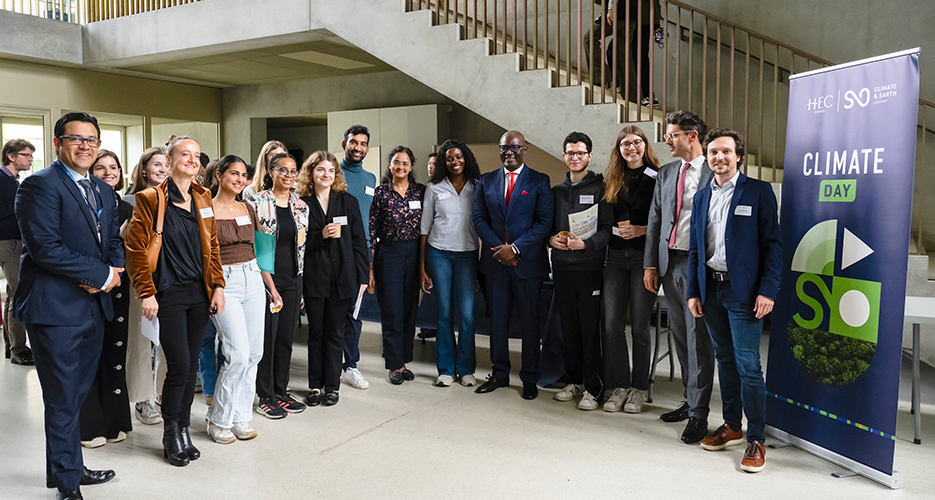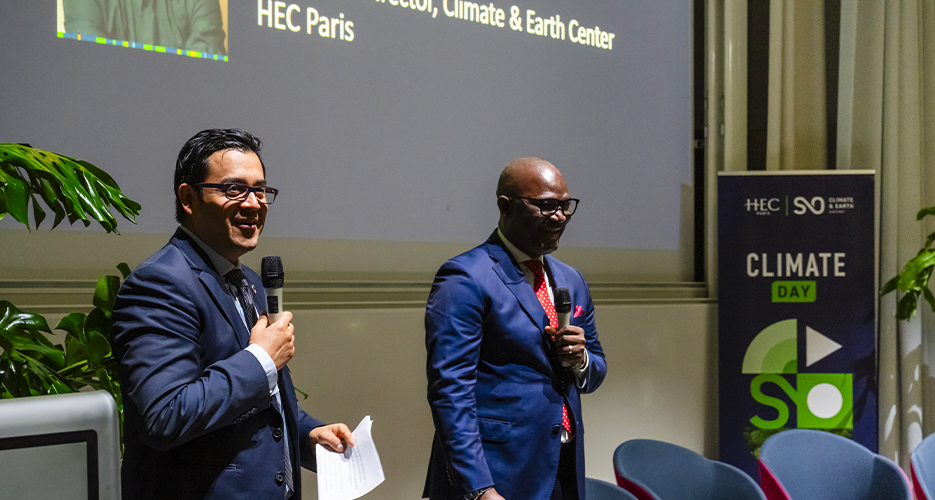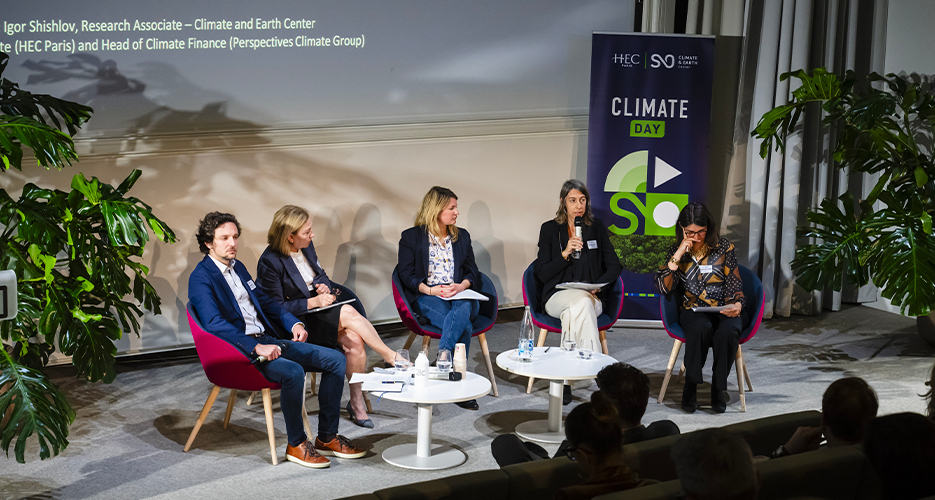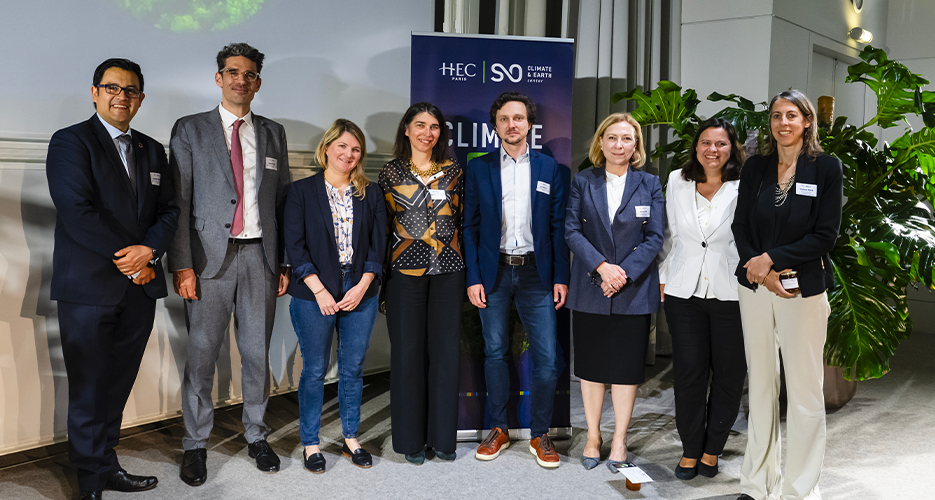HEC Climate Day: Helping to Navigate the Path to Net Zero
HEC Climate Day: Helping to Navigate the Path to Net ZeroHow is Africa building resilience to tackle the risks posed by global warming? What measures are being taken to scale up international climate finance? Why is it important to mobilize private savings to accelerate the low carbon transition? How can companies co-create sustainability across the value chain? These were just some of the questions at the heart of the third HEC Climate Day organized by the S&O Climate & Earth Center. An intense exchange between students, academics and experts, designed to address the climate emergency. The event opened with a keynote lecture by UN Assistant General Secretary Ibrahima Cheikh Diong.

Les organisateurs d'HEC et les invités à la troisième édition du Climate Day © Marcella Barbieri
This May 22 2024 Climate Day was one of a trilogy of events this year devoted to fundamental issues of purpose, inclusion and the environment. They were all organized by HEC’s Sustainability & Organization (S&O) Institute. “We were very excited at the prospect of bringing together our students, government representatives, corporate partners, and specialists for a full day of discussion around climate,” said co-organizer Daniel Halbheer. The Academic Director of HEC’s Climate & Earth Center started designing the program eight months ahead of the event, alongside his fellow Research Associate Igor Shishlov. The two academics are behind the award-winning Climate & Business Certificate, and many of its students were amongst the 100-plus participants at this Climate Day. “The conference was a powerful reminder of what we can do when we assemble different views and learn together,” said Halbheer.

Fernando Diaz Lopez (left) and Ibrahima Diong © Marcella Barbieri
With COP29 on the horizon, this on-campus event centered on issues like climate finance and the Loss and Damage Fund, a topic which is set to be the focus of the summit in Baku, Azerbaijan, in November. Countries most vulnerable to the effects of climate change are hoping that the world’s richest countries will propose concrete measures and finance to assist them with an ecological transition resiliency building. This projection set the scene perfectly for the Climate Day’s key speaker, Ibrahima Cheikh Diong. The Senior UN Official is also Director General of the African Risk Capacity (ARC) Group, an agency the African Union has mandated to provide climate risk insurance management assistance to countries in Africa. “Ibrahima Diong is a thought leader in climate resilience,” noted Fernando Diaz Lopez, the recently appointed Executive Director of the Climate & Earth Center, after Diong’s keynote speech. “His presentation on global policy before and after the Paris COP21 was a perfect curtain-raiser for the day. I appreciated his proposals to put into action the Loss & Damage fund to bridge the gap between the available financing and solutions to achieve transformational climate resilience.”
Diaz Lopez is well placed to judge. The applied researcher specializes in the intersection between eco-innovation, sustainability transitions and circularity in business, value chains and industry. As a former coordinator of the Horizon Europe Pathways2Resilience consortium (the flagship project of the European Mission on Adaptation to Climate Change), he particularly appreciated Diong’s call for action for global solidarity and cooperation. This is all the more relevant in that his native African continent is responsible for under 4% of global warming. Yet, said Diaz Lopez, it is “disproportionately affected by climate change, suffering significant financial resources.” (See the exclusive interview of Diong for more details).
Efforts to Bolster Europe’s Environmental Resilience
For the school’s dean, Eloïc Peyrache, the conference is also a steppingstone towards building bridges between HEC and the ARC Group directed by Ibrahima Diong. “We believe that the voice of Africa has to be stronger,” Peyrache said in addressing Diong, “and we support your efforts to bolster the continent’s resilience. We at HEC wish to enrich your work on the Loss and Damage Fund negotiations, as well as exploring together how to improve the fund’s financial approach. Think, Teach and Act is part of HEC’s DNA, and we believe that this is part of Acting in navigating the path towards Net Zero. We all know that we can no longer think incremental change, it’s all about transformation, for time is not on our side.”
This urgency was very much in line with the philosophy promoted by Reclaim Finance and its Advocacy Officer, Antoine Laurent, . Laurent works for an NGO which considers finance is a critical lever in the fight against climate change. Yet, he believes, traditional finance remains at odds with the goals of climate and social justice: “The way we work,” he explained, “is to maintain a constant dialogue with most of the financial players. We know their arguments and constraints. We know why they can’t push quicker in the right direction.” In the second of three panel debates, Laurent shared the floor with a representative of these traditional financial institutions (BNP Paribas) and new generation of banks (Green-Got). “These are contradictory exchanges are part of the game. But our discussions have evolved as realities about climate change appear more and more flagrant. Some people don't see the financial interest in moving forward in the right direction, there’s not enough consideration for the climate emergency. They don't move, that's all. And so, our role as an NGO is to persuade them to change, to show the increased reputational and financial risks of missing the boat.”
Trillions of Euros to Finance the Transition
Antoine Laurent was part of a debate on mobilizing private savings towards the low-carbon transition. It was chaired by HEC professor François Gemmene, the renowned climate specialist, co-author of the IPCC report. He underlined the role that France’s private sector could play for this transition: “French savings represents between €4-6 trillion, that’s almost 50% of our annual GDP! Life insurance savings alone are up to €1.8 trillion. Isn’t the key to make sure such funds do not go towards the fossil fuels?” he said, turning to the panelists. Indeed, for Gemenne, banks – from the largest to the smallest - play a vital role in squaring this circle. In the course of the 90-minute panel, representatives from BNP Paribas' Eleonore Bedel, and Green-Got's Maud Caillaux outlined their answers to his question. The latter created her bank four years ago to circumvent what she called the clash between generations: “People of my age are really tired of the insignificant gestures that traditional banks are making towards the transition,” Caillaux said. “They want policies that have an impact and are 100% transparent. What we’ve built at Green-Got answers this demand.”
International Climate Finance
The day's two other panels also probed the challenges provoked by climate change (we invite readers to enjoy them in their entirety through the Youtube reruns). The first discussed scaling up international climate finance. Chaired by HEC Research Associate Igor Shishlov, it featured the founder and managing director of Clima Capital Partners, Joumana Asso, the I4CE project manager Claire Eschlier, AFD’s Deputy Director for Climate and Nature, Stéphanie Mouen, and Pascale Albert-Lebrun, deputy CEO at Eranova Group. The participants agreed that current flows of climate finance towards developing countries is critically insufficient, especially for adaptation. The panelists discussed the role of public finance as a catalyst of private sector investments, the need for supportive climate policies and the importance of innovative financial instruments, such as guarantees.
 Professor Igor Shishlov and panelists © Marcella Barbieri
Professor Igor Shishlov and panelists © Marcella Barbieri
For Shishlov, Climate Day was an appropriate culmination for the HEC students who had followed his five-week Climate & Business program: “The 40 students embarked on a journey to explore the challenges and opportunities of the ecological transition from individual, organizational, and societal perspectives,” he noted after the conference. “From lectures on climate policy and economics to practical exercises in calculating GHG emissions and devising decarbonization strategies, our students learned from some of the best researchers, policymakers, and business practitioners working on climate solutions.”
Perspectives from Practitioners
The third Climate Day panel, led by the holder of the FII Institute chair, Daniel Halbheer, turned to co-creating sustainability all across the value chain. It brought together four business leaders with a long track record combining ESG goals, sustainability and profits. Michèle Lacroix is the Group Head of Sustainability at SCOR. She characterized her company’s journey as testimony of a heightened degree of maturity. Lacroix insisted that ESG and the financial materiality of a company are two sides of the same coin and need to be considered simultaneously. Since 2014, the human rights aspect of ESG has been strongly developed by the family-owned luxury company Chalhoub. Based in the Middle East, it employs over 15,000 people and has opened 700 outlets. During the panel debate, its Chief Sustainability Officer, Florence Bulté, said the turning point for her firm was joining the UN Global impact program 10 years ago. Chalhoub Group focused on gender parity by increasing the number of women in senior posts. Its objective of 33% is, Bulté said, an ambitious one in a region where gender parity remains a taboo subject.
In terms of ESG objectives, the turning point for Schneider Electric was also around 10 years ago. Fabien Chêne told the audience that sustainability has been at the heart of company strategy ever since. The head of Sustainability Business Europe highlighted this engagement with a focus on three KPIs but insisted the company can do even more to reach the UN SDG goals. This drive was mirrored by the fourth panelist, David Grall, the VP of Sustainability & Corporate Transformation at Nexans. He outlined the three-pronged approach adopted by his industrial company, allying environmental and human rights prerogatives with financial profit. Grall said the cable and optical fiber manufacturing firm has been able to double its profitability since 2018, all the while reducing its impact on the environment and increasing its societal engagement: “We link these three pillars without any detrimental action to each other. It might be surprising but it works!”

Co-organizers and panelists © Marcella Barbieri
The Students’ Viewpoints
The ten-hour event culminated in the presentation by two amongst HEC’s most talented students from the Master in Sustainability And Social Innovation (SASI), Leonie Hoffmann and Antoine Meyer. Reflecting on the day, they praised the healthy dialogue that it instilled: “These exchanges give me hope,” said Hoffman. “Today we saw debates between business leaders, policy advisers, NGO representatives and faculty members. We had contradictory opinions but it was the kind of healthy discussion that’s needs to find concrete solutions for transition.” Meyer hoped the next Climate Day could build on such a foundation: “We will need more people from the political arena and the public sector because business workers are also citizens who have a public duty to accelerate change. And governments have legal power to implement laws and coordinate efforts in this huge transformation we’re calling on.”
The two students from the Noughties turned to improvements they imagined for schools like HEC. “We can’t deny the positive evolution over the past 15 years,” admitted Hoffmann. “At the conference today, our professor, Igor Shishlov, compared current program contents favorably with what he had known as an HEC student back in 2010. But let’s go further: I would like faculty, staff and students to become more aware of climate change and the science behind it. Every faculty member should be trained to understand what’s at stake and integrate it in their courses. Basically, we need to make these issues the foundation or groundwork of each program.” Meyer went beyond the business school: ‘I see it as vital for all higher education institutions. And even before they arrive there! Let’s see these issues taught in secondary schools, with classes allying climate change and concrete scientific approaches. We need to bring everyone together to think and act in tackling this environmental breakdown.”
All this is music to the ears of Daniel Halbheer and Igor Shishlov. The latter also heads the Climate Finance department at Perspectives Climate Group. He insisted HEC has a vital role to play in perspective: “This school has a social responsibility in preparing these students and future leaders. And events like Climate Day help us mold students into changemakers and contribute to the ecological transition.”
Have a look to all the sessions of the HEC Climate Day
More about the S&O Climate & Earth Center